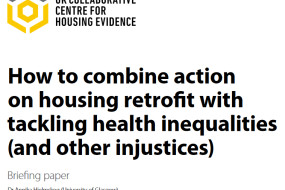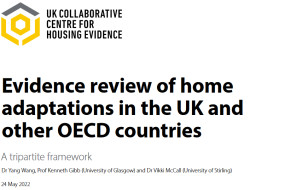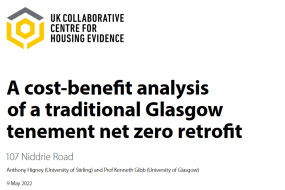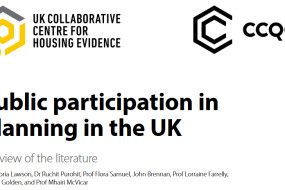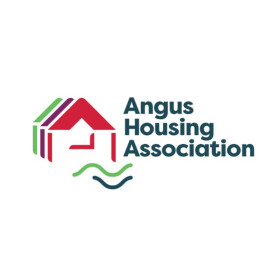Housing associations have been urged to come forward and take part in a new survey aimed at exploring the reality of social housing allocations in the UK. The research, conducted by homelessness charity Crisis and the UK Collaborative Centre for Housing Evidence (CaCHE), will examine how allocations
Cache
The UK Collaborative Centre for Housing Evidence (CaCHE) has published the final output in its project on housing systems, their institutions and their resilience. Covering the period up to March 2022, the new report seeks to examine the evolution of the housing system between the global financial c
The UK Collaborative Centre for Housing Evidence (CaCHE) has published a new paper that examines major policy developments related to domestic abuse and housing in Scotland and England since the Covid-19 pandemic struck. There is growing interest in how policies focused on domestic abuse and ho
In a guest blog for the UK Collaborative Centre for Housing Evidence (CaCHE), Pedro Cameron from Housing Options Scotland highlights the link between homelessness and inequality, and explains why it’s crucial for local authorities to embed Inclusion, Diversity, Equality and Accessibility (IDEA
New research has been published by the UK Collaborative Centre for Housing Evidence (CaCHE) that explores how to combine action on housing retrofit with tackling health inequalities.
A personal commentary on the discussions that arose during sessions at the CaCHE / Policy Scotland Scottish Housing Policy Conference, which focussed on the Scottish Government’s proposed ‘New Deal for Tenants’, has been published by Professor Duncan Maclennan. Mr&nb
Professor Ken Gibb and Professor Alex Marsh have published a new briefing paper that provides examples of the range of contemporary international rent control or rent regulation practice as operated in the private rented sector (PRS), highlighting a small number of European examples in a little
In the context of a steadily ageing society and the continuing impetus to expand appropriate residential solutions in the community for older people, the UK Collaborative Centre for Housing Evidence (CaCHE) is pursuing a series of interlocked projects that consider different aspects of housing adap
CaCHE director, Professor Ken Gibb, outlines plans for the next phase of the UK Collaborative Centre for Housing Evidence (CaCHE). We are delighted to announce that the UK Collaborative Centre for Housing Evidence (CaCHE) has been funded for another four years. The funding from ESRC and AHRC will co
Dr Jenny Preece, a research associate at the UK Collaborative Centre for Housing Evidence, outlines the approach to producing a new animation which highlights the experiences of those living through the building safety crisis and the impact that it has had on their everyday life.
A new paper has been published as part of a major collaborative project evaluating the net zero retrofit of a traditional tenement in Glasgow.
The UK Collaborative Centre for Housing Evidence (CaCHE) and the Community Consultation for Quality of Life Project (CCQoL) have published a review of research on participation, engagement & consultation in planning with a focus on the UK complete with policy recommendations.
Professor Mark Stephens and Dr Rod Hick explain the development of comparative housing research and suggest that care must be taken when seeking to learn lessons from other countries. In 1933 a delegation of councillors from Leeds visited Vienna seeking solutions to the city’s housing problem.
In the latest in the Equality, Diversity and Inclusion blog series from the UK Collaborative Centre for Housing Evidence (CaCHE), Paul Willis, Brian Beach and the DICE team from Housing LIN explain that housing schemes for older people help to alleviate loneliness, however,
As part of the UK Collaborative Centre for Housing Evidence (CaCHE) equality, diversity and inclusion series, guest author Lisa Vine reflects on the increase in LGBT+ specific housing in the UK, highlighting the need for housing providers to create homes and communities that are not only safe s







